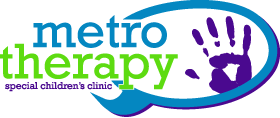Why My Child’s Therapy Looks Like Play
When a child participates in pediatric therapy, it often appears at first glance that they aren’t learning anything or developing any new skills. Many parents get concerned that no work is being done because, to an outside observer, the therapist is just playing with the child. In some cases, the child is even directing the play themselves! But there is a big difference between regular playtime and pediatric therapy. Play-based pediatric therapy is a powerful treatment that improves a child’s overall ability using the familiar medium of play. While the child is simply having fun, their therapist is focused on modeling and guiding the child through familiar activities that will build their developmental skills. Your child's pediatric therapy session may look like playtime, but it was designed that way to help children enjoy and participate in therapy to reach their potential.
The Role of Play-Based Pediatric Therapy
Why do pediatric therapy sessions look like playtime? Play provides children with the opportunity to learn, develop skills, express their emotions, and interact with others in a way that is engaging and enjoyable. And children all over the world learn new skills by playing. For example, most parents and teachers help children learn the alphabet using the ABC song.
A play-based therapy session is designed to be fun and stimulating by allowing the child to explore and interact with their environment. Pediatric therapists enable children to develop their physical, social, emotional, and cognitive skills through carefully chosen and fun activities. So even though it doesn’t always look like work, play-based therapy helps children overcome developmental delays, behavioral problems, and other challenges that may impact their ability to learn and thrive.
Play-Based Pediatric Occupational Therapy Develops Your Child's Perceptions
Children have fun during pediatric occupational therapy sessions, but there is much more happening when they are participating in play based activities. The therapist is guiding a child to develop skills through play because it’s a child’s job to play and the most appropriate way to develop these skills. In fact, play can develop critical skills such as:
Hand-eye coordination
Spatial awareness
Fine and gross motor skills
Balance
Coordination.
These skills lay the foundation for future academic and social aptitude, which is why play-based occupational therapy is an essential tool for a child’s success in school and beyond.
The Importance of Tactile Input During Pediatric Occupational Therapy
A common tool used during occupational therapy sessions is sensory integration. A large part of our sensory system processes tactile input or sense of touch. This is a common system an occupational therapy will work in. It has proven to be highly effective in assisting children improve acceptance of hygiene routines, increasing foods accepted and improving toileting success.
The Importance of Vestibular Input During Pediatric Occupational Therapy
The vestibular system is located in the inner ear, and it is responsible for providing feedback to the brain about head movement and orientation in space. This system is critical in helping children develop balance, coordination, and spatial awareness. Occupational therapists incorporate activities like swinging, rolling, and jumping that stimulate the vestibular system to promote developmental growth in this area.
The Importance of Proprioceptive Input During Pediatric Occupational Therapy
Proprioception refers to the body's sense of where it is in space and the effort required to move it. This sense is vital for everyday activities such as standing, walking, and grasping objects. By incorporating activities that provide this type of sensory input, occupational therapists improve a child's ability to recognize where their body is in space, which can have a significant impact on their ability to participate in school, playtime, sports, and other areas of life.
Play-Based Pediatric Speech and Language Therapy Improves Your Child's Ability to Communicate
Play-based therapy is not only used to develop motor skills, it has also proven to be highly effective in improving children's communication skills. By incorporating play into speech and language therapy sessions, children are more motivated to participate and have fun while learning. Play-based activities encourage children to build their language skills while also working on important social and cognitive development. And it’s all done at the level most children understand best: play!
The Benefits of Play-Based Pediatric Therapy
Play-based pediatric therapy is an effective and enjoyable way for children to learn and develop their skills:
It increases a child’s willingness to participate in their therapy sessions because it is engaging and motivating.
It enables children to practice their developmental skills in a supportive environment where they can learn without judgment of right or wrong.
It encourages creativity and imagination, which in turn develops children’s problem-solving skills.
It introduces things that are frightening or uncomfortable (such as sensory input, social situations, foods, etc.) in a safe and fun way, which gives children the courage to overcome their barriers.
It builds a child’s confidence and independence for lifelong success
Schedule Your Free Pediatric Therapy Screening
If you suspect that your child is struggling with developmental growth, we’re here to help. Pediatric therapy is an effective tool to help your child overcome their delays and reach their full potential. At Metro Therapy, we offer free pediatric therapy screenings to identify your child’s strengths and weaknesses so we can deliver treatment tailored to their specific needs. Call us at (763) 450-9400 to schedule your first appointment today.

